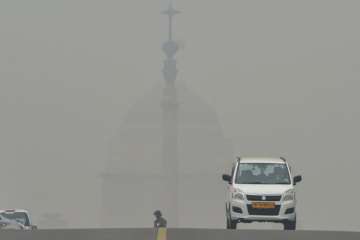Delhi's air quality remains 'severe' for 4th consecutive day
The advisory also recommended frequent wet mopping and use of masks known as N-95 or P-100 respirators only for outdoor activities.
Delhi's air quality remained in the 'severe' category for the fourth consecutive day on Tuesday as meteorological conditions continued to be unfavourable for dispersion of pollutants, authorities said. The city is facing its worst pollution crisis since Diwali.
While the Central Pollution Control Board (CPCB) data showed the overall air quality index (AQI) at 'severe' level of 416, the Centre-run System of Air Quality and Weather Forecasting (SAFAR) recorded an AQI of 423.
Twenty-five areas recorded severe pollution levels, while nine recorded very poor air quality, the CPCB data showed.
In the NCR, Faridabad, Ghaziabad and Noida recorded severe pollution while Gurgaon recorded 'very poor' quality air.
The overall PM2.5 level (fine particulate matter in the air with a diameter of less than 2.5 micrometre) was recorded at 271 and the PM10 level at 422 here, the CPCB said.
Delhi's air quality had turned 'severe' on Saturday. The national capital recorded its second highest pollution level of the year on Sunday with an AQI of 450. According to the SAFAR, the overall air quality in Delhi is expected to remain in the 'severe' range till Tuesday.
"Recovery got delayed mainly due to slowing of wind speed, leading to persistence of fog which rapidly multiplied finer particles, leading to rapid increase in PM2.5 and even PM1 (fine particulate matter in the air with a diameter of less than 1 micrometre)," it said.
"Improvement is expected from late Tuesday evening only when radiation fog get dissipated with sufficient sunshine," it added.
According to the Indian Institute of Tropical Meteorology (IITM), air quality is likely to improve on Tuesday, but will remain in the upper end of the 'very poor' or in the 'severe' category.
"The wind speed and ventilation index are highly unfavourable for dispersion of pollutants," it said.
Ventilation index is the speed at which pollutants can get dispersed. A ventilation index lower than 6,000 sqm/second, with average wind speed less than 10 kmph, is unfavourable for dispersion of pollutants. The index on Tuesday was 5,000 sqm/second on Tuesday, the IITM said.
In view of the prevalence of severe pollution in the national capital, industrial activities in pollution hotspots of Wazirpur, Mundka, Narela, Bawana, Sahibabad and Faridabad, and construction work across the Delhi-NCR will remain shut till Wednesday, EPCA Chairperson Bhure Lal said.
The Environment Pollution Control and Prevention Authority (EPCA) has directed traffic police to deploy special teams and ensure congestion-free vehicular movement, particularly in identified high traffic corridors.
The agencies concerned have also been asked to ensure strict action against illegal industries and make all efforts to control polluting activities, particularly waste burning.
In a health advisory, the SAFAR has asked Delhiites not to rely on common dust masks for protection. The agency has advised people to avoid all outdoor activities, such as taking walks. "If the room has windows, close them, if the air conditioner provides a fresh air intake option then choose it, avoid burning anything such as wood, candle or even an incense," it said.
The advisory also recommended frequent wet mopping and use of masks known as N-95 or P-100 respirators only for outdoor activities.
"Do not rely on dust masks for protection," the advisory added.
